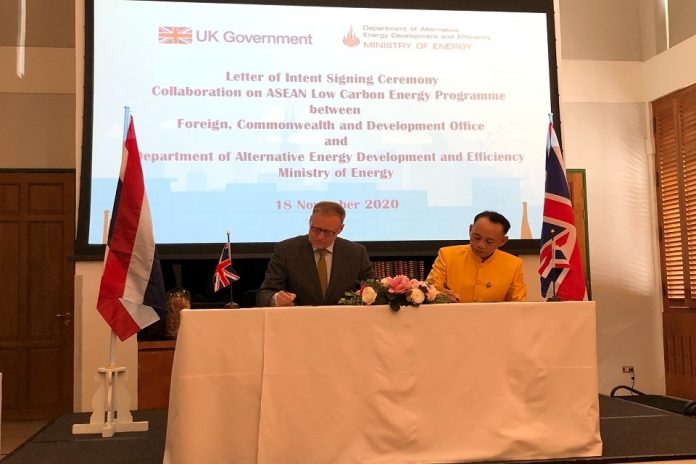On 18 November 2020, the UK’s Foreign, Commonwealth and Development Office (FCDO), and the Department of Alternative Energy Development and Efficiency (DEDE) under the Ministry of Energy of Thailand signed the Letter of Intent (LoI) to establish a long-term partnership to work together on energy efficiency under the UK’s ASEAN Low Carbon Energy Programme. The programme aims to encourage the transition to low carbon energy in Thailand while creating real energy cost savings for people and businesses, and so promoting economic growth in Thailand.
The planned partnership will provide technical assistance and knowledge sharing to support shared learning and Thai efforts to improve energy efficiency in 4 strategic areas:
- developing a more advanced methodology and analysis of data to assess energy efficiency;
- creating an appropriateregulatory environment and market opportunities for energy service companies or ESCOs, companies which support the implementation of energy efficiency measures;
- supporting the implementation of Thailand’s Energy Efficiency Plan 2018 (EEP 2018); and
- enhancingthe development and implementation of energy performance standards for electric motorsin industrial sector.
The two sides hope that the cooperation will help strengthen Thailand’s energy efficiency policy and practices, enhance the local energy efficiency market, and assure Thailand’ sustainability.
Speaking at the signing ceremony, H.E. Brian Davidson, the British Ambassador to Thailand said
Energy efficiency is about creating real cost savings for people and businesses. In the UK energy efficiency measures to improve insulation and heating efficiency alone have cut the annual energy costs of households by the equivalent of up to 25,000 Baht per year.As the co-Presidency of the COP26 UN global climate change negotiations next November, the UK believes energy efficiency has a key role to play in preventing catastrophic climate change. We applaud Thailand for its efforts to improve energy efficiency and so help businesses and people save money. I am sure that the signing of this Letter of Intent today with the Department of Alternative Energy Development and Efficiency will ensure the continuation of our ambitious partnership to lower carbon emissions, cut energy costs, and create job opportunities.
Dr. Prasert Sinsukprasert, DEDE Director General said
The technical cooperation under the ASEAN Low carbon Energy programme that United Kingdom provides to Thailand such as implementing MEPS (Minimum Energy Performance Standards), advancing the methodology and analysis of energy data for key industrial sub sectors, and improving regulatory and market opportunities for ESCOs are top priority items for the Ministry of Energy’s agenda. Consequently, the programme also strengthens the implementation of Thailand Energy Efficiency Plan (EEP2018) which aims to reduce energy intensity by 30% in 2037, comparing with the level in 2010. DEDE have been working on promoting energy efficiency and conservation in Thailand and our focus covers 5 economic sectors consisting of industry, building, household, agriculture and transport. There are 3 categories of energy efficiency measures including compulsory measure, voluntary measure and complementary measure. Example of the measures implemented in Thailand such as building codes, energy efficiency resources standard, financial support, EE innovation support, human resource development, public relation and awareness, etc. These initiatives do not only help Thailand’s energy efficiency improvement, but also Thailand’s environmental footprint by lowing energy use and reducing greenhouse gas emissions. Upon signing up to the Paris accord, Thailand voluntarily committed to reducing greenhouse gases by 20-25% by 2030 based on 2005 emission levels.
Energy transition is a pathway toward transformation of the global energy sector from fossil-based to zero-carbon. Renewable energy and energy efficiency measures can potentially achieve 90% of the required carbon reductions. The energy transition will be enabled by information technology, smart technology, policy frameworks and market instruments. Thus, Thailand needs to develop our potential to achieve this transformation by learning more from others. I hope we can do it together with UK in the future.
For more information:
-
Thailand has set out plans to cut energy demand by 6% by 2037 in its Power Development Plan.
-
As of 2017, energy intensity in the UK was 17% below that in 2000 (i.e. energy efficiency had improved by 20%). The UK calculates that energy efficiency is the most cost effective way to cut greenhouse gases and so prevent climate change. It is targeting net zero greenhouse gas emissions by 2050.
-
The ASEAN Low Carbon Energy Programme (ALCEP) is funded by the UK’s Overseas Development Assistance budget under the UK Government’s Prosperity Fund. The programme seeks to support ASEAN countries to transition to low carbon societies and realise economic and wider benefits as a result. The programme runs from 2019 to 2022.
-
The ALCEP is part of wider collaboration between the UK and Thailand on energy and low carbon transition. The UK has also been working closely with various departments under the Thai Ministry of Energy. For example, we support a.) the study of Peer to Peer Energy Trading in Thailand to enable households and premises with micro generation to sell excess electricity to their community, improving their return on investment and incentivising uptake; b.) the study of Renewable Energy Certificate to encourage greater expansion of renewable energy; and c.) development of Thailand 2050 Calculator which helps policy makers and members of the public to explore the energy options available for the future. We also collaborate with financial regulators to encourage sustainable finance and equip financial institutions with knowledge to manage impact of climate related risks in the financial sector through capacity building and experience sharing.







